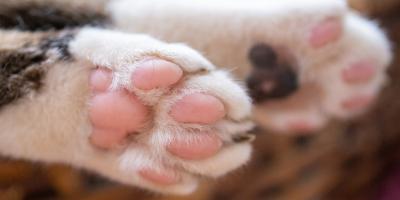Before trying a home remedy for cats, always speak to your vet first!
Cats are known for being very secretive creatures. They love to hide away in a secluded, quiet spot where they feel safe, but their secretive habits can make it a bit tricky for owners to know when they’re not feeling well.
Even if your feline feels very unwell, many cats will just become a bit quieter and hide away – something that isn’t always very obvious to even the most doting of cat owners.
Because of this, it’s really important that cat owners contact their vet before starting any home treatments, even if their pet’s symptoms seem quite mild. Your vet will know how to interpret the signs they’re showing and be able to advise you on whether or not your cat needs to be checked over.
Veterinary Home Treatments for Cats
While we don’t recommend starting your own feline home treatments, your vet will often advise you to start or continue giving medications at home. It’s essential that owners understand why continuing to give these medications is important as giving treatments under your vet’s instruction can not only help to keep your cat fit and well, it can also help to prevent future health problems.
We’ve created a useful guide that covers the most common treatments that vets will recommend cat owners can give at home.
Treatments and Home Remedies for Fleas on Cats
Flea treatments are probably the most common medication your vet will ask you to give at home as these pesky critters are very easy for your cat to catch. And it’s really important to keep up-to-date with your cat’s flea treatment year-round as this can prevent them from developing a flea issue in the first place!
You can also try using a veterinary recommended environmental flea spray, thoroughly vacuuming your house and washing your cat’s bedding on the hot water laundry cycle, as all these things will help to get rid of the fleas and their various life stages living in your house. However, always make sure you do these things in addition to treating your cat (and all other animals if you have them!), as this is the most important step to get rid of fleas.
And you can also ask your vet for further advice on treating other pesky parasites!
Itchy Skin
There are lots of reasons why your cat can develop itchy skin. If you see them starting to scratch, or if their skin is starting to look dry or sore, it’s always best to see your vet who will be able to advise you.
Some of the most common things that can cause itchy, flaky skin in cats include:
- A poor-quality diet: This will affect you cat’s ability to form a healthy, protective barrier and may trigger skin reactions. It’s also really important to store cat food properly by following the instructions on the pack, as this can affect the food’s fatty acid content. You can always speak to your vet for recommendations regarding the best diet for your feline.
- Obesity: This can mean your cat may not be able to move around properly or stretch to groom themselves.
- Parasites (including fleas): These creepy crawlies can often damage your cat’s skin and trigger reactions.
Treatments and Home Remedies for Hairballs in Cats
If your cat is producing hairballs, it’s best to speak to your vet for advice on treatments, and you can read about what a hairball is and why some cats produce them in our cat hairball article.
There are cat hairball foods available which can act to minimize hairball formation, and there are also hairball pastes containing laxatives and lubricants that can help to move hair through the digestive system. But always speak to a veterinary professional before starting new diets or treatments and remember to transition slowly to any new foods.
Veterinary Treatments and Home Solutions for Urinary Problems in Cats
If you notice your cat is having trouble urinating, or if you see blood in their urine (which may appear as a pink tinge), always contact your vet right away, as this could be a sign of a more serious condition.
There are lots of different things that can cause urinary problems in cats, and your vet can advise you about them. If your veterinarian thinks that your cat may have a urinary condition due to stress – a condition known as idiopathic cystitis – there are a number of things you can do to help alleviate this problem.
Cat owners may try several changes at home: a different litter tray, a different litter type, or moving the litter tray. Cats can be super fussy about where they pee! Sometimes they just don’t like the cat litter or litter tray you provide them, and other times, they may want it moved to a new room where they feel more comfortable peeing. If your cat doesn’t want to pee for some reason, this, in itself, may make them stressed, and they may also hold their pee or urinate in inappropriate places. And you can read about other ways to help reduce cat stress below.
Home Remedies and Solutions for Cat Stress
There are many things that can make your cat stressed. Cats are peculiar animals, so not only are the things that stress them out often odd (even moving the sofa can stress your cat out), but also the symptoms that your cat displays to showing they are stressed can also be a little strange (urinary problems, hiding away, eating less, etc.). If you think your cat may be stressed, get in touch with your vet for further advice.
Here are some steps you can take at home to try and lower your feline’s stress levels:
Feline Pheromones: There are a variety of plug-ins and sprays that release synthetic feline pheromones (which mimic the odor that cats naturally produce) that can help cats feel secure and comfortable, thereby reducing stress.
Managing a Multi-Cat Household: If you own more than one cat, this can create conflict and stress as cats can sometimes struggle to get along. To help combat this, it’s really important to make sure you have a food bowl/water bowl/litter tray for each cat you own, and then one extra one. This may sound excessive, but it can actually help to lower stress levels as cats are often not very good at sharing. It’s also a good idea to make sure that each of your cats has plenty of space and hiding places up high where they can be alone, if needed.
Are There Any Home Remedies for Cat Wounds?
Contact your vet immediately if you notice a wound on your cat. Although the wound may look like something you can manage on your own, it can often be very tricky to properly assess how deep a wound is, especially if it’s painful. There is also always a risk of infection which can delay or prevent healing.
Because of this, the best course of action for all feline wounds is to get the wound checked out by a veterinary professional who will be able to advise if treatment is needed.
Home Remedies NOT to Give Your Cat!
It can often be very tempting to treat your cat at home in order to avoid a trip to the vet. But it’s important that owners always consider how cats are very prone to developing toxicities to medications that are perfectly safe for their owners.
One example of this is acetaminophen. This drug is highly toxic to cats – even in small amounts – and should never be given under any circumstance.
You should always consult your vet before starting any medication – even medications that are safe for cats can be fatal if given incorrectly. It’s just not worth the risk!
For more expert tips on keeping your cat healthy, explore our other cat health articles.
Related articles

Earn myPurina Rewards with Every Purchase
Use your points for treats, toys, and gift cards with myPurina app.







